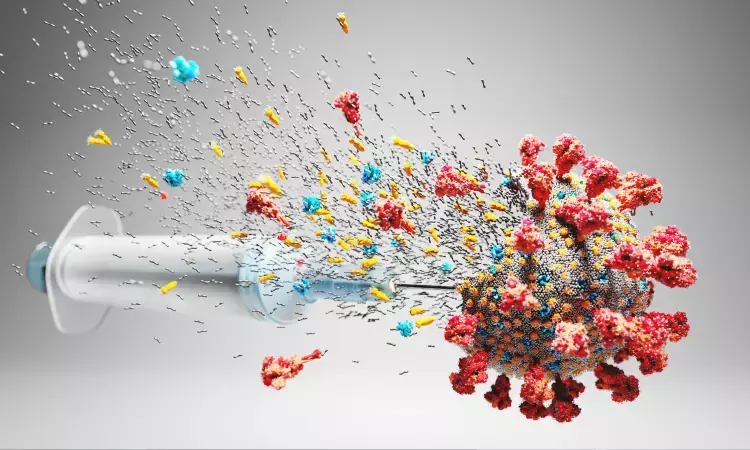- Home
- Medical news & Guidelines
- Anesthesiology
- Cardiology and CTVS
- Critical Care
- Dentistry
- Dermatology
- Diabetes and Endocrinology
- ENT
- Gastroenterology
- Medicine
- Nephrology
- Neurology
- Obstretics-Gynaecology
- Oncology
- Ophthalmology
- Orthopaedics
- Pediatrics-Neonatology
- Psychiatry
- Pulmonology
- Radiology
- Surgery
- Urology
- Laboratory Medicine
- Diet
- Nursing
- Paramedical
- Physiotherapy
- Health news
- Fact Check
- Bone Health Fact Check
- Brain Health Fact Check
- Cancer Related Fact Check
- Child Care Fact Check
- Dental and oral health fact check
- Diabetes and metabolic health fact check
- Diet and Nutrition Fact Check
- Eye and ENT Care Fact Check
- Fitness fact check
- Gut health fact check
- Heart health fact check
- Kidney health fact check
- Medical education fact check
- Men's health fact check
- Respiratory fact check
- Skin and hair care fact check
- Vaccine and Immunization fact check
- Women's health fact check
- AYUSH
- State News
- Andaman and Nicobar Islands
- Andhra Pradesh
- Arunachal Pradesh
- Assam
- Bihar
- Chandigarh
- Chattisgarh
- Dadra and Nagar Haveli
- Daman and Diu
- Delhi
- Goa
- Gujarat
- Haryana
- Himachal Pradesh
- Jammu & Kashmir
- Jharkhand
- Karnataka
- Kerala
- Ladakh
- Lakshadweep
- Madhya Pradesh
- Maharashtra
- Manipur
- Meghalaya
- Mizoram
- Nagaland
- Odisha
- Puducherry
- Punjab
- Rajasthan
- Sikkim
- Tamil Nadu
- Telangana
- Tripura
- Uttar Pradesh
- Uttrakhand
- West Bengal
- Medical Education
- Industry
Transfusion of convalescent plasma promises mortality benefits in immunocompromised COVID-19 patients

Mayo Clinic: A recent Original Investigation for Infectious Diseases published in JAMA Network Open has mentioned that convalescent plasma is tied to mortality benefits to hospitalised patients with primary or secondary immunosuppression and COVID-19.
Immunocompromised patients have a higher risk for morbidity and mortality associated with COVID-19. They mount antibody responses less frequently to vaccines. To treat COVID-19, neutralizing anti-spike monoclonal-antibody treatment has been used, but evolutions of SARS-CoV-2 have been related to monoclonal antibody-resistant SARS-CoV-2 variants and greater virulence and transmissibility of SARS-CoV-2. COVID-19 convalescent plasma has increased therapeutically based on the presumption that plasma contains antibodies to SARS-CoV-2, which are potentially therapeutic and can be transferred passively to the recipient.
What is the pooled evidence in this context?
Investigating further, a researchers team did a study to assess the growing reports of clinical experiences of COVID-19 immunocompromised patients treated with COVID-19 convalescent plasma transfusion. The lead researcher was Jonathon W.Senefeld, PhD. The study points are:
• The researchers selected relevant RCTs, matched cohort studies, and case reports or series
• Four hundred sixty-two unique records were yielded in the electronic search, and 199 were considered for full-text screening.
• All-cause mortality after COVID-19 convalescent plasma transfusion was the prespecified endpoint.
• The exploratory subgroup analyses were based on putative factors related to the potential mortality benefit of convalescent plasma.
• The review and meta-analysis included the following:
3 RCT enrolled 1487 participants.
Five matched cohort studies
13 uncontrolled large case series enrolled 358 participants.
125 case report series enrolled 265 participants.
• Transfusion of COVID-19 convalescent plasma decreased mortality than the control cohort for the amalgam of both RCT and matched cohort studies having a risk ratio [RR] of 0.63
To conclude, the researchers encourage using therapeutic convalescent plasma in COVID-19 patients with immunosuppression (primary or secondary); there remains a lack of well-controlled, published data in these important patient populations.
Further investigations are warranted in this context.
Further reading:
Senefeld JW et al. COVID-19 Convalescent Plasma for the Treatment of Immunocompromised Patients: A Systematic Review and Meta-analysis. doi:10.1001/jamanetworkopen.2022.50647
BDS, MDS in Periodontics and Implantology
Dr. Aditi Yadav is a BDS, MDS in Periodontics and Implantology. She has a clinical experience of 5 years as a laser dental surgeon. She also has a Diploma in clinical research and pharmacovigilance and is a Certified data scientist. She is currently working as a content developer in e-health services. Dr. Yadav has a keen interest in Medical Journalism and is actively involved in Medical Research writing.
Dr Kamal Kant Kohli-MBBS, DTCD- a chest specialist with more than 30 years of practice and a flair for writing clinical articles, Dr Kamal Kant Kohli joined Medical Dialogues as a Chief Editor of Medical News. Besides writing articles, as an editor, he proofreads and verifies all the medical content published on Medical Dialogues including those coming from journals, studies,medical conferences,guidelines etc. Email: drkohli@medicaldialogues.in. Contact no. 011-43720751


